From Leisure to Responsibility: Environmental Awareness of Domestic Tourists in Greece on Climate, Water Resources, and Renewable Energy Use
Abstract
1. Introduction
1.1. Vulnerabilities of Tourism in Greece
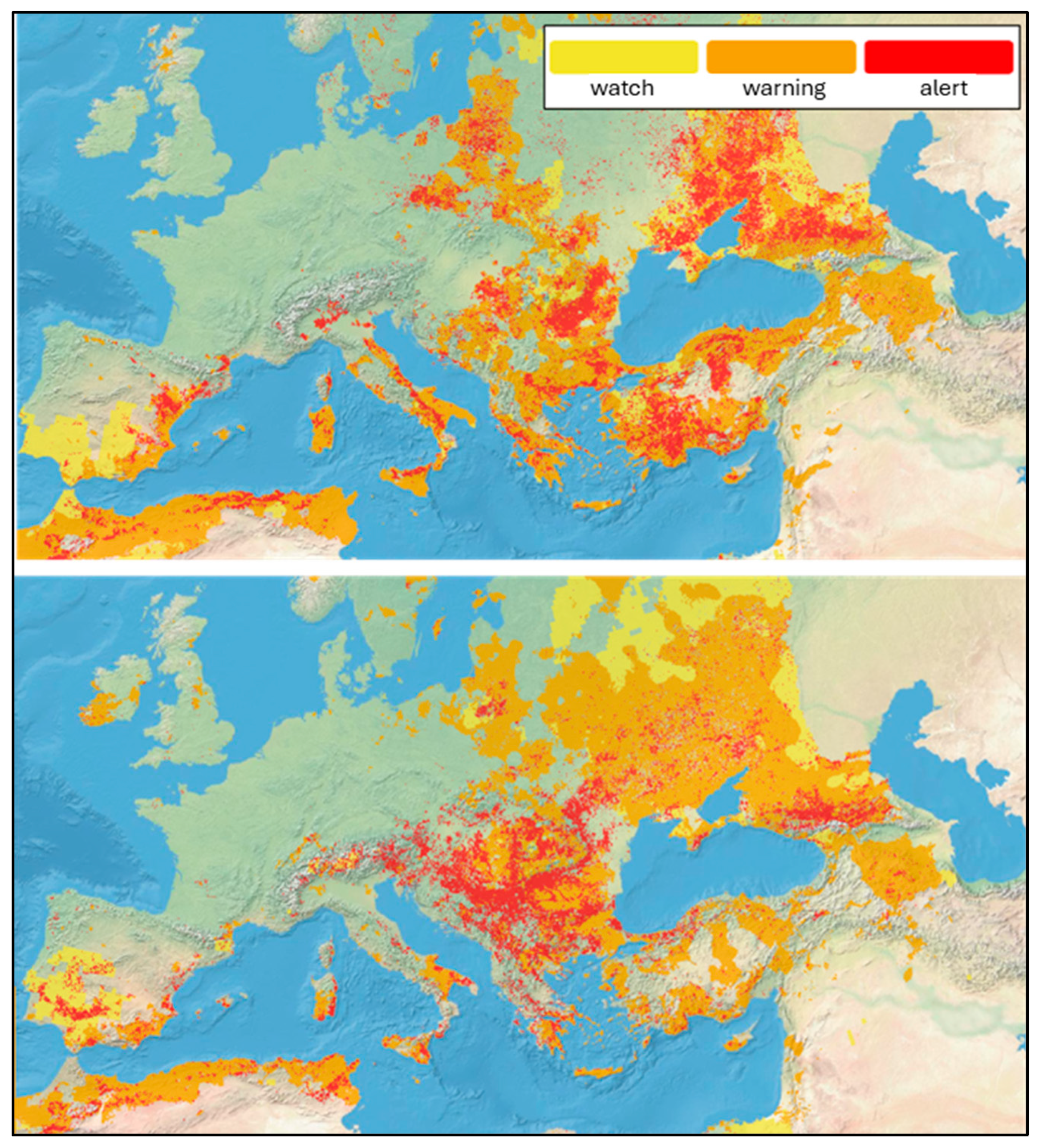
1.2. The Impact of Environmental Awareness on Attitude and Responsible Behavior
1.3. Present Work’s Objective Contributions
2. Materials and Methods
2.1. Design of Research Questions
- Awareness of climate change effects on tourism and water resources;
- Awareness of RESs and opinions on their role in water and resource management in tourism;
- Willingness to accept additional costs or actions associated with sustainable practices.
- Perceptions of the importance of most significant effects (e.g., drought, extreme weather events);
- Perceptions of the adequacy of current legal and policy frameworks;
- Willingness to choose destinations adopting RES practices;
- Acceptance of initiatives promoting RES integration in tourism;
2.2. Data Analysis
3. Results and Discussion
4. Conclusions
Funding
Institutional Review Board Statement
Informed Consent Statement
Data Availability Statement
Acknowledgments
Conflicts of Interest
Appendix A
| Q6. Are you aware of the impacts of climate change? | Count (N) | % |
| At a very high level | 48 | 4% |
| At a high level | 179 | 14.91% |
| Enough | 523 | 43.58% |
| Not enough | 292 | 24.33% |
| Not at all | 158 | 13.16% |
| Q7. Are you aware of the legislation related to climate change? | Count (N) | % |
| At a very high level | 220 | 18.33% |
| At a high level | 491 | 40.91% |
| Enough | 299 | 24.91% |
| Not enough | 125 | 10.41% |
| Not at all | 65 | 5.41% |
| Q8. Do you believe climate change affects tourism? | Count (N) | % |
| I am certain | 73 | 6.08% |
| I largely believe it | 170 | 14.16% |
| I believe it to an extent | 425 | 35.41% |
| I have limited belief on it | 370 | 30.83% |
| I am certain that it does not | 162 | 13.5% |
| Q9. Which one of the following climate change effects do you consider as the most important? | Count (N) | % |
| The Sea level rise | 148 | 12.33% |
| The Extreme weather | 530 | 44.16% |
| The Desertification | 81 | 6.75% |
| The Water scarcity | 317 | 26.41% |
| The impact on Biodiversity | 124 | 10.33% |
| Q10. Do you believe that climate change has already affected the water resources in tourismtic destinations? | Count (N) | % |
| I am certain | 43 | 3.5% |
| I largely believe it | 172 | 14.33% |
| I believe it to an extent | 434 | 36.16% |
| I have limited belief on it | 333 | 27.75% |
| I am certain that it does not | 218 | 18.16% |
| Q11. Which one of the following climate change effects do you regard as the most important for tourismtic destinations? | Count (N) | % |
| The Water scarcity | 402 | 33.5% |
| The Temperature rise | 344 | 28.66% |
| The Desertification | 70 | 5.83% |
| The high frequency of extreme weather (floods, droughts) | 384 | 32% |
| Q12. Do you believe that the tourismtic sector needs to adapt water resource management to tackle climate change effects? | Count (N) | % |
| Yes, it needs to act immediately | 827 | 68.91% |
| Yes, it needs to be done in the long term | 333 | 27.75% |
| No, I do not think adaptations are needed | 40 | 3.33% |
| Q13. Do you agree that the legislation regarding climate change needs to become stricter? | Count (N) | % |
| I Completely Agree | 87 | 7.25% |
| I Agree | 92 | 7.66% |
| I am Neutral | 121 | 10.08% |
| I Disagree | 420 | 35% |
| I Completely Disagree | 480 | 40% |
| Q14. Which one do you recognize as the basic obstacle in tackling climate change? | Count (N) | % |
| The Lack of awareness | 293 | 24.41% |
| The Cost of implementing solutions | 398 | 33.16% |
| The Lack of political will | 509 | 42.41% |
| Q15. Are you aware of what the Renewable Energy Sources (RES) technologies are? | Count (N) | % |
| At a very high level | 41 | 3.4% |
| At a high level | 189 | 15.75% |
| Enough | 409 | 30.08% |
| Not enough | 335 | 27.91% |
| Not at all | 226 | 18.83% |
| Q16. Do you believe that RES use in tourism can reduce climate change effects? | Count (N) | % |
| I am certain | 62 | 5.16% |
| I largely believe it can | 138 | 11.5% |
| I believe it to an extent that it can | 361 | 30.08% |
| I have limited belief that it can | 392 | 32.66% |
| I am certain that it cannot | 247 | 20.58% |
| Q17. How much do you think that RES use in tourismtic accommodation can affect your choices on which to visit? | Count (N) | % |
| It affects my choices substantially | 276 | 23% |
| It affects my choices to a high degree | 326 | 27.16% |
| It affects my choices to a degree | 333 | 27.75% |
| It affects my choices a little | 183 | 15.25% |
| It does not affect my choices at all | 82 | 6.83% |
| Q18. Do you believe that RES use can affect the attractiveness of a destination? | Count (N) | % |
| I am certain | 133 | 11.08% |
| I largely believe it can | 291 | 24.25% |
| I believe it to an extent that it can | 414 | 34.5% |
| I have limited belief that it can | 276 | 23% |
| I am certain that it cannot | 86 | 7.16% |
| Q19. Would you be willing to choose tourismtic accommodation that makes use of RES even if it is more expensive? | Count (N) | % |
| I would certainly be willing | 279 | 23.25% |
| I would most likely be willing | 367 | 30.58% |
| I could be willing | 349 | 29.08% |
| I would most likely not be willing | 149 | 12.41% |
| I would certainly not be willing | 56 | 4.6% |
| Q20. What do you think is the biggest obstacle for RES adoption in tourism? | Count (N) | % |
| The Cost of investments | 585 | 48.75% |
| The Lack of technological skills | 176 | 14.66% |
| The Lack state support | 439 | 36.58% |
| Q21. Do you believe that RES use can enhance the international competitiveness of a destination? | Count (N) | % |
| I am certain | 70 | 5.83% |
| I largely believe it can | 230 | 19.16% |
| I believe it to an extent that it can | 456 | 38% |
| I have limited belief that it can | 315 | 26.25% |
| I am certain that it cannot | 129 | 10.75% |
| Q22. Do you believe that RES use can contribute to reducing running costs of tourismtic accommodation? | Count (N) | % |
| I am certain | 51 | 4.25% |
| I largely believe it can | 132 | 11% |
| I believe it to an extent that it can | 415 | 34.58% |
| I have limited belief that it can | 390 | 32.5% |
| I am certain that it cannot | 212 | 17.66% |
| Q23. Would you be willing to pay more to visit a destination that makes use of RES? | Count (N) | % |
| I would certainly be willing | 231 | 19.25% |
| I would most likely be willing | 364 | 30.3% |
| I could be willing | 391 | 32.5% |
| I would most likely not be willing | 161 | 13.41% |
| I would certainly not be willing | 52 | 4.33% |
| Q24. Would you participate in actions that promote RES use in tourismtic destinations? | Count (N) | % |
| I would certainly participate | 161 | 13.41% |
| I would most likely participate | 298 | 24.83% |
| I could participate | 420 | 35% |
| I would most likely not participate | 226 | 18.83% |
| I would certainly not participate | 95 | 7.91% |
| Q25. In what degree do you believe that tourismtic infrastructure should adopt RES? | Count (N) | % |
| Extensively | 53 | 4.4.1% |
| A lot | 126 | 10.5% |
| Enough | 383 | 31.91% |
| Not so much | 430 | 35.83% |
| Not at all | 207 | 17.25% |
References
- Gabric, A.J. The Climate Change Crisis: A Review of Its Causes and Possible Responses. Atmosphere 2023, 14, 1081. [Google Scholar] [CrossRef]
- Bilgili, M.; Tumse, S.; Nar, S. Comprehensive Overview on the Present State and Evolution of Global Warming, Climate Change, Greenhouse Gasses and Renewable Energy. Arab. J. Sci. Eng. 2024, 49, 14503–14531. [Google Scholar] [CrossRef]
- Pizzorni, M.; Innocenti, A.; Tollin, N. Droughts and floods in a changing climate and implications for multi-hazard urban planning: A review. City Environ. Interact. 2024, 24, 100169. [Google Scholar] [CrossRef]
- Sato, H.; Mizoi, J.; Shinozaki, K.; Yamaguchi-Shinozaki, K. Complex plant responses to drought and heat stress under climate change. Plant J. 2024, 117, 1873–1892. [Google Scholar] [CrossRef]
- Rahman, G.; Jung, M.-K.; Kim, T.-W.; Kwon, H.-H. Drought impact, vulnerability, risk assessment, management and mitigation under climate change: A comprehensive review. KSCE J. Civ. Eng. 2025, 29, 1001209. [Google Scholar] [CrossRef]
- Lopes, H.S.; Nascimento, D.T.F. The Vulnerability of Tourism to Climate Change in Portuguese and Brazilian Cities—A Review. Proceedings 2025, 113, 4. [Google Scholar] [CrossRef]
- Sottini, V.A.; Barbierato, E.; Bernetti, I.; Capecchi, I. Impact of Climate Change on Wine Tourism: An Approach through Social Media Data. Sustainability 2021, 13, 7489. [Google Scholar] [CrossRef]
- Miller, A.B.; Winter, P.L.; Sánchez, J.J.; Peterson, D.L.; Smith, J.W. Climate Change and Recreation in the Western United States: Effects and Opportunities for Adaptation. J. For. 2022, 120, 453–472. [Google Scholar] [CrossRef]
- Willwerth, J.; Sheahan, M.; Chan, N.; Fant, C.; Martinich, J.; Kolian, M. The Effects of Climate Change on Outdoor Recreation Participation in the United States: Projections for the Twenty-First Century. Weather Clim. Soc. 2023, 15, 477–492. [Google Scholar] [CrossRef] [PubMed] [PubMed Central]
- Hidalgo-García, D.; Founda, D.; Rezapouraghdam, H. Spatiotemporal variability of the Universal Thermal Climate Index during heat waves using the UrbClim climate model: Implications for tourism destinations. Urban Clim. 2025, 59, 102281. [Google Scholar] [CrossRef]
- Chang, D.; Bu, N.; Zhang, N.; Xiao, H. Climate change and tourism demand: Risks for extreme heat? Heliyon 2024, 10, e37186. [Google Scholar] [CrossRef] [PubMed]
- Wanner, A.; Mostegl, N.; Pröbstl-Haider, U. Walking on sunshine: Application of a choice experiment to understand impacts of climate change on tourism attractions. J. Outdoor Recreat. Tour. 2024, 48, 100837. [Google Scholar] [CrossRef]
- Wilkins, E.J.; Horne, L. Effects and perceptions of weather, climate, and climate change on outdoor recreation and nature-based tourism in the United States: A systematic review. PLoS Clim. 2024, 3, e0000266. [Google Scholar] [CrossRef]
- Mnguni, Z.; Fitchett, J.M. Hot nights on holiday: Advocating for caution when excluding night-time thermal comfort from tourism climate indices. Curr. Issues Tour. 2025, 1–14. [Google Scholar] [CrossRef]
- Kifworo, C.M.; Dube, K. Wildlife Tourism and Climate Change: Perspectives on Maasai Mara National Reserve. Climate 2024, 12, 185. [Google Scholar] [CrossRef]
- Dapilah, F.; Bedigbee, B.A.; Bonye, S.Z. Adaptation to climate change in nature-based tourist destination in northern Ghana. J. Outdoor Recreat. Tour. 2025, 51, 100918. [Google Scholar] [CrossRef]
- De la Vara, A.; Cabos, W.; Gutiérrez, C.; Olcina, J.; Matamoros, A.; Pastor, F.; Khodayar, S.; Ferrando, M. Climate change impacts on the tourism sector of the Spanish Mediterranean coast: Medium-term projections for a climate services tool. Clim. Serv. 2024, 34, 100466. [Google Scholar] [CrossRef]
- Tejedor, E.; Benito, G.; Serrano-Notivoli, R.; González-Rouco, F.; Esper, J.; Büntgen, U. Recent heatwaves as a prelude to climate extremes in the western Mediterranean region. npj Clim. Atmospheric Sci. 2024, 7, 218. [Google Scholar] [CrossRef]
- Kourgialas, N.N. A critical review of water resources in Greece: The key role of agricultural adaptation to climate-water effects. Sci. Total Environ. 2021, 775, 145857. [Google Scholar] [CrossRef]
- Santos, E. Thirst for Change in Water Governance: Overcoming Challenges for Drought Resilience in Southern Europe. Water 2025, 17, 2170. [Google Scholar] [CrossRef]
- Phan, T.D.; Bertone, E.; Pham, T.D.; Pham, T.V. Perceptions and willingness to pay for water management on a highly developed tourism island under climate change: A Bayesian network approach. Environ. Chall. 2021, 5, 100333. [Google Scholar] [CrossRef]
- Mdoda, S.S.; Dube, K.; Montsiemang, T. Tackling Water and Waste Management Challenges Within the Tourism and Hospitality Industry: A Sustainable Development Goals Perspective. Water 2024, 16, 3545. [Google Scholar] [CrossRef]
- Miralles, C.C.; Barioni, D.; Mancini, M.S.; Jordà, J.C.; Roura, M.B.; Salas, S.P.; Argelaguet, L.L.; Galli, A. The Footprint of tourism: A review of Water, Carbon, and Ecological Footprint applications to the tourism sector. J. Clean. Prod. 2023, 422, 138568. [Google Scholar] [CrossRef]
- Cazcarro, I.; Hoekstra, A.; Chóliz, J.S. The water footprint of tourism in Spain. Tour. Manag. 2014, 40, 90–101. [Google Scholar] [CrossRef]
- McCarroll, M.J.; LaVanchy, G.T.; Kerwin, M.W. Tourism resilience to drought and climate shocks: The role of tourist water literacy in hotel management. Ann. Tour. Res. Empir. Insights 2024, 5, 100147. [Google Scholar] [CrossRef]
- Veijalainen, N.; Ahopelto, L.; Marttunen, M.; Jääskeläinen, J.; Britschgi, R.; Orvomaa, M.; Belinskij, A.; Keskinen, M. Severe Drought in Finland: Modeling Effects on Water Resources and Assessing Climate Change Impacts. Sustainability 2019, 11, 2450. [Google Scholar] [CrossRef]
- Banerjee, O.; Bark, R.; Connor, J.; Crossman, N.D. An ecosystem services approach to estimating economic losses associated with drought. Ecol. Econ. 2013, 91, 19–27. [Google Scholar] [CrossRef]
- Prettenthaler, F.; Kortschak, D.; Woess-Gallasch, S. Modelling tourist’s responses to climate change and its effects on alpine ski tourism–A comparative approach for European Regions. J. Outdoor Recreat. Tour. 2022, 39, 100525. [Google Scholar] [CrossRef]
- Karaferi, E.; Chatzidaki, A.; Solstad, J.; Vamvatsikos, D. Quantitative assessment of the impact of climate change to the tourism of Tønsberg, Norway. Int. J. Disaster Risk Reduct. 2025, 120, 105351. [Google Scholar] [CrossRef]
- Zhang, W.; Jia, C.; Liu, Z.; He, P.; Enle, W. Examining the impact of tourism on carbon neutrality and environmental sustainability in China: The role of renewable energy. Energy Strat. Rev. 2024, 56, 101579. [Google Scholar] [CrossRef]
- Tverijonaite, E.; Sæþórsdóttir, A.D.; Ólafsdóttir, R.; Hall, C.M. The interrelationships between renewable energy infrastructure and tourism: A thematic literature review. Environ. Dev. 2024, 52, 101080. [Google Scholar] [CrossRef]
- Tsagarakis, K.P.; Bounialetou, F.; Gillas, K.; Profylienou, M.; Pollaki, A.; Zografakis, N. Tourists’ attitudes for selecting accommodation with investments in renewable energy and energy saving systems. Renew. Sustain. Energy Rev. 2011, 15, 1335–1342. [Google Scholar] [CrossRef]
- Gössling, S.; Lund-Durlacher, D. Tourist accommodation, climate change and mitigation: An assessment for Austria. J. Outdoor Recreat. Tour. 2021, 34, 100367. [Google Scholar] [CrossRef]
- Campos, C.; Gutiérrez, D.; Dias, A.C.; Quinteiro, P.; Herrero, Á.; Gallego, M.; Villanueva-Rey, P.; Laso, J.; Albertí, J.; Fullana-I-Palmer, P.; et al. ‘Small-scale’ tourism versus traditional tourism: Which will be the new key to achieve the desired sustainable tourism? Sci. Total. Environ. 2024, 912, 168964. [Google Scholar] [CrossRef]
- Al-Thani, H.; Koç, M.; Isaifan, R.J.; Bicer, Y. A Review of the Integrated Renewable Energy Systems for Sustainable Urban Mobility. Sustainability 2022, 14, 10517. [Google Scholar] [CrossRef]
- Machado, J.T.M.; de Andrés, M. Implications of offshore wind energy developments in coastal and maritime tourism and recreation areas: An analytical overview. Environ. Impact Assess. Rev. 2023, 99, 106999. [Google Scholar] [CrossRef]
- Tverijonaite, E.; Sæþórsdóttir, A.D.; Ólafsdóttir, R.; Hall, C.M. How close is too close? Mapping the impact area of renewable energy infrastructure on tourism. Energy Res. Soc. Sci. 2022, 90, 102574. [Google Scholar] [CrossRef]
- Michailidou, A.V.; Vlachokostas, C.; Moussiopoulos, Ν. Interactions between climate change and the tourism sector: Multiple-criteria decision analysis to assess mitigation and adaptation options in tourism areas. Tour. Manag. 2016, 55, 1–12. [Google Scholar] [CrossRef]
- INSETE Intelligence. The Contribution of Tourism to the Greek Economy in 2023. Available online: https://insete.gr/publications (accessed on 6 July 2025).
- Soklis, G.; Petrakos, G.; Panousi, S. The Contribution of the Hotel Industry to the Greek Economy. Tour. Hosp. 2025, 6, 11. [Google Scholar] [CrossRef]
- Ioannidis, F.; Kosmidou, K.; Papanastasiou, D. Public awareness of renewable energy sources and Circular Economy in Greece. Renew. Energy 2023, 206, 1086–1096. [Google Scholar] [CrossRef]
- Dritsaki, M.; Dritsaki, C.; Argyriou, V.; Sarigiannidis, P. Impact of renewable and non-renewable generation on economic growth in Greece. Electr. J. 2024, 37, 107421. [Google Scholar] [CrossRef]
- Ioannidis, F.; Georgitsioti, T.; Kosmidou, K.; Zopounidis, C.; Andriosopoulos, K. A simulation model for imbalance costs of renewable energy aggregators: The case of Greek balancing market. Energy Econ. 2025, 142, 108155. [Google Scholar] [CrossRef]
- Lampropoulos, A.; Varvoutis, G.; Athanasiou, C.; Marnellos, G.E. Assessing the electricity potential from agricultural residues in Western Macedonia, Greece. Renew. Sustain. Energy Rev. 2025, 214, 115530. [Google Scholar] [CrossRef]
- Marotta, A.; Porras-Amores, C.; Sánchez, A.R.; Sáez, P.V.; Masera, G. Greenhouse Gas Emissions Forecasts in Countries of the European Union by Means of a Multifactor Algorithm. Appl. Sci. 2023, 13, 8520. [Google Scholar] [CrossRef]
- Chatzinikolaou, D. Integrating Sustainable Energy Development with Energy Ecosystems: Trends and Future Prospects in Greece. Sustainability 2025, 17, 1487. [Google Scholar] [CrossRef]
- Sun, Y.-Y.; Faturay, F.; Lenzen, M.; Gössling, S.; Higham, J. Drivers of global tourism carbon emissions. Nat. Commun. 2024, 15, 10384. [Google Scholar] [CrossRef]
- Boemi, S.; Slini, T.; Papadopoulos, A.; Mihalakakou, Y. A Statistical Approach to the Prediction of the Energy Performance of Hotel Stock. Int. J. Vent. 2011, 10, 163–172. [Google Scholar] [CrossRef]
- Loumakis, S.; Giannini, E.; Maroulis, Z. Renewable Energy Sources Penetration in Greece: Characteristics and Seasonal Variation of the Electricity Demand Share Covering. Energies 2019, 12, 2441. [Google Scholar] [CrossRef]
- Lee, J.; Kim, J.; Hong, T.; Mun, S.G.; Koh, K.; Koo, C. Scalable investigation of energy usage patterns and saving potential in hotel guestrooms: Focused on occupancy states and electrical installations. Energy Build. 2024, 302, 113735. [Google Scholar] [CrossRef]
- Tsiaras, E.; Andreosatou, Z.; Kouveli, A.; Tampekis, S.; Coutelieris, F.A. Off-Grid Methodology for Sustainable Electricity in Medium-Sized Settlements: The Case of Nisyros Island. Clean Technol. 2025, 7, 16. [Google Scholar] [CrossRef]
- Spiller, M.; Müller, C.; Mulholland, Z.; Louizidou, P.; Küpper, F.C.; Knosala, K.; Stenzel, P. Reducing Carbon Emissions from the Tourist Accommodation Sector on Non-Interconnected Islands: A Case Study of a Medium-Sized Hotel in Rhodes, Greece. Energies 2022, 15, 3801. [Google Scholar] [CrossRef]
- Kosmopoulos, D.K.; Bideris-Davos, A.A.; Vovos, P.N. Optimal micro-pump-storage system for the average Greek hotel with PV generation. Energy Storage Convers. 2024, 2, 1515. [Google Scholar] [CrossRef]
- Papathanasiou, A.-F.; Ntemiri, K.; Baltas, E. Sustainable Water Resources Management and Energy Production in Small Mediterranean Islands. Environ. Process. 2025, 12, 19. [Google Scholar] [CrossRef]
- Karvounidi, M.D.; Alexandropoulou, A.P.; Fousteris, A.E. Towards Sustainable Hospitality: Enhancing Energy Efficiency in Hotels. Int. Res. J. Econ. Manag. Stud. 2024, 3, 410–420. [Google Scholar] [CrossRef]
- Tsiaras, E.; Papadopoulos, D.N.; Antonopoulos, C.N.; Papadakis, V.G.; Coutelieris, F.A. Coutelieris, 8-Sustainable off-grid power supply for small settlements. In Hybrid Energy Systems, Hybrid Technologies for Power Generation; Lo Faro, M., Barbera, O., Giacoppo, G., Eds.; Academic Press: Amsterdam, The Netherlands, 2022; pp. 219–247. [Google Scholar] [CrossRef]
- Lemesios, I.; Varotsos, K.V.; Georgopoulou, E.; Sarafidis, Y.; Kapetanakis, D.; Mirasgedis, S.; Gakis, N.; Giannakopoulos, C. Effects of Climate Change on the Future Attractiveness of Tourist Destinations in Greece. Atmosphere 2024, 15, 1185. [Google Scholar] [CrossRef]
- Katavoutas, G.; Founda, D.; Kitsara, G.; Giannakopoulos, C. Climate Change and Thermal Comfort in Top Tourist Destinations—The Case of Santorini (Greece). Sustainability 2021, 13, 9107. [Google Scholar] [CrossRef]
- Sardianou, E.; Kostakis, I.Ε. Perceived barriers to invest in renewable energy sources in the Cretan hotel industry. Int. J. Sustain. Energy 2019, 39, 240–249. [Google Scholar] [CrossRef]
- Casadei, S.; Peppoloni, F.; Pierleoni, A. A New Approach to Calculate the Water Exploitation Index (WEI+). Water 2020, 12, 3227. [Google Scholar] [CrossRef]
- Water Abstracted by Sector of Use. Available online: https://ec.europa.eu/eurostat/databrowser/product/page/TEN00006 (accessed on 6 July 2025).
- Georgoulias, A.K.; Akritidis, D.; Kalisoras, A.; Kapsomenakis, J.; Melas, D.; Zerefos, C.S.; Zanis, P. Climate change projections for Greece in the 21st century from high-resolution EURO-CORDEX RCM simulations. Atmos. Res. 2022, 271, 106049. [Google Scholar] [CrossRef]
- Motta, C.; Naumann, G.; Gomez, D.; Formetta, G.; Feyen, L. Assessing the economic impact of droughts in Europe in a changing climate: A multi-sectoral analysis at regional scale. J. Hydrol. Reg. Stud. 2025, 59, 102296. [Google Scholar] [CrossRef]
- Voudouris, S.; Loukas, A.; Sidiropoulos, P.; Vasiliades, L. Assessing the Vulnerability of Water Resources to Drought by Applying the Standardized Drought Vulnerability Index to the Lake Karla Basin. Proceedings 2025, 32, 15. [Google Scholar] [CrossRef]
- Vasilakou, C.; Tsesmelis, D.E.; Kalogeropoulos, K.; Barouchas, P.E.; Machairas, I.; Feloni, E.G.; Tsatsaris, A.; Karavitis, C.A. Assessing Drought Severity in Greece Using Geospatial Data and Environmental Indices. Geomatics 2025, 5, 10. [Google Scholar] [CrossRef]
- Skroufouta, S.; Mavrogiannis, A.; Baltas, E. A Methodological Framework for the development of a hybrid renewable energy system with seawater Pumped storage Hydropower system under uncertainty in Karystos, Greece. Sustain. Energy Technol. Assess. 2024, 71, 104002. [Google Scholar] [CrossRef]
- Skroufouta, S.; Baltas, E. Investigation of hybrid renewable energy system (HRES) for covering energy and water needs on the Island of Karpathos in Aegean Sea. Renew. Energy 2021, 173, 141–150. [Google Scholar] [CrossRef]
- Copernicus Emergency Management Service. Drought Maps, Europe. 2025. Available online: https://drought.emergency.copernicus.eu/tumbo/edo/map/ (accessed on 6 July 2025).
- Vourdoubas, J. The Undesired Impacts of Overtourism in the Island of Crete, Greece. Int. J. Adv. Multidiscip. Res. Stud. 2024, 4, 868–874. [Google Scholar] [CrossRef]
- Liu, Z.; Lan, J.; Chien, F.; Sadiq, M.; Nawaz, M.A. Role of tourism development in environmental degradation: A step towards emission reduction. J. Environ. Manag. 2022, 303, 114078. [Google Scholar] [CrossRef]
- Candia, S.; Pirlone, F. Tourism Environmental Impacts Assessment to Guide Public Authorities towards Sustainable Choices for the Post-COVID Era. Sustainability 2022, 14, 18. [Google Scholar] [CrossRef]
- Chai, S.; Wei, M.; Tang, L.; Bi, X.; Yu, Y.; Yang, J.; Jie, Z. Can public opinion persuade the government to strengthen the use of environmental regulation policy tools? Evidence from policy texts. J. Clean. Prod. 2024, 434, 140352. [Google Scholar] [CrossRef]
- Dabbous, A.; Croutzet, A.; Horn, M. Achieving energy resilience: The joint role of environmental policy stringency and environmental awareness. Res. Int. Bus. Financ. 2025, 74, 102692. [Google Scholar] [CrossRef]
- Liu, T.-K.; Chang, H.; Chen, Y.-S. Public awareness of marine environmental quality and its relationship for policy support on marine waste management. Mar. Pollut. Bull. 2023, 195, 115456. [Google Scholar] [CrossRef] [PubMed]
- Wang, J.; Zhou, Y. Impact of mass media on public awareness: The “Under the Dome” effect in China. Technol. Forecast. Soc. Chang. 2021, 173, 121145. [Google Scholar] [CrossRef]
- Borawska, A. The Role of Public Awareness Campaigns in Sustainable Development. Econ. Environ. Stud. 2017, 17, 865–877. [Google Scholar] [CrossRef]
- Yamane, T.; Kaneko, S. Exploring the impact of awareness on public acceptance of emerging energy technologies: An analysis of the oil palm industry. J. Clean. Prod. 2023, 414, 137593. [Google Scholar] [CrossRef]
- Sanchez, E.; Vinueza, R.; Izurieta, X.; Rey, N. Use of muralism to promote awareness about aquatic ecosystems and wise water consumption in northwestern Ecuador. Ocean Coast. Manag. 2020, 190, 105165. [Google Scholar] [CrossRef]
- Afridi, F.; Debnath, S.; Somanathan, E. A breath of fresh air: Raising awareness for clean fuel adoption. J. Dev. Econ. 2021, 151, 102674. [Google Scholar] [CrossRef]
- Almulhim, A.I. Understanding public awareness and attitudes toward renewable energy resources in Saudi Arabia. Renew. Energy 2022, 192, 572–582. [Google Scholar] [CrossRef]
- Tourlioti, P.N.; Portman, M.E.; Pantelakis, I.; Tzoraki, O. Awareness and willingness to engage in climate change adaptation and mitigation: Results from a survey of Mediterranean islanders (Lesvos, Greece). Clim. Serv. 2024, 33, 100427. [Google Scholar] [CrossRef]
- Zhang, L.; Yue, M.; Qu, L.; Ren, B.; Zhu, T.; Zheng, R. The influence of public awareness on public participation in environmental governance: Empirical evidence in China. Environ. Res. Commun. 2024, 6, 095024. [Google Scholar] [CrossRef]
- Merli, R.; Preziosi, M.; Acampora, A.; Lucchetti, M.; Ali, F. The impact of green practices in coastal tourism: An empirical investigation on an eco-labelled beach club. Int. J. Hosp. Manag. 2019, 77, 471–482. [Google Scholar] [CrossRef]
- Suryawan, I.W.K.; Rahman, A.; Suhardono, S.; Lee, C.-H. Visitor willingness to pay for decarbonizing tourism: Supporting a net-zero transition in Nusa Penida, Indonesia. Energy Sustain. Dev. 2025, 85, 101628. [Google Scholar] [CrossRef]
- Vicente, J.M. Green tourist behavior analysis and its relationship with the choice of eco-tourism destination: An empirical study. Int. J. Geoheritage Park. 2024, 12, 544–557. [Google Scholar] [CrossRef]
- Zhang, Y.; Zhao, H.; Zaman, U. Eco-consciousness in tourism: A psychological perspective on green marketing and consumer behavior. Acta Psychol. 2025, 255, 104951. [Google Scholar] [CrossRef]
- Suryawan, I.W.K.; Rahman, A.; Suhardono, S.; Sutrisno, A.D.; Nguyen, V.V.; Lee, C.-H. Evaluating tourist preferences influences on renewable energy initiatives in coastal tourism settings. Reg. Stud. Mar. Sci. 2025, 85, 104148. [Google Scholar] [CrossRef]
- Aliyah, U.; Williady, A.; Kim, H.-S. An Evaluation of Green Hotels in Singapore, Sentosa Island: A Big Data Study Through Online Review. Tour. Hosp. 2025, 6, 24. [Google Scholar] [CrossRef]
- Nagaj, R.; Žuromskaitė, B. Young Travellers and Green Travel in the Post-COVID Era. Sustainability 2023, 15, 13822. [Google Scholar] [CrossRef]
- Pallero-Flores, C.; Oviedo, J.L.; Tovar-Sánchez, A.; Moreno, C.; Rodríguez-Romero, A. A Survey of Beachgoers to Estimate Sunscreen Coastal Water Input and Potential Eco-Label Consumption: Contributions to Sustainable Tourism. Sustainability 2024, 16, 8575. [Google Scholar] [CrossRef]
- Chen, J.; Huang, Y.; Wu, E.Q.; Ip, R.; Wang, K. How does rural tourism experience affect green consumption in terms of memorable rural-based tourism experiences, connectedness to nature and environmental awareness? J. Hosp. Tour. Manag. 2023, 54, 166–177. [Google Scholar] [CrossRef]
- Mteti, S.H.; Mpambije, C.J.; Manyerere, D.J. Unlocking cultural tourism: Local community awareness and perceptions of cultural heritage resources in Katavi Region in southern circuit of Tanzania. Soc. Sci. Humanit. Open 2025, 11, 101295. [Google Scholar] [CrossRef]
- Barney, A.; Polatidis, H.; Vakalis, S.; Grondin, D.; Benne, M.; Salces, F.S.; Haralambopoulos, D. Energy transition awareness: Can it guide local transition planning on islands? Heliyon 2023, 9, e19960. [Google Scholar] [CrossRef] [PubMed]
- Wootton, N.; Nursey-Bray, M.; Holland, S.; Gillanders, B.M. Better understanding ocean awareness: Insights from young people. Mar. Policy 2024, 164, 106159. [Google Scholar] [CrossRef]
- Atanasova, A.; Naydenov, K. Perceptions of the Barriers to the Implementation of a Successful Climate Change Policy in Bulgaria. Climate 2025, 13, 40. [Google Scholar] [CrossRef]
- Ahmed, S.K. How to choose a sampling technique and determine sample size for research: A simplified guide for researchers. Oral Oncol. Rep. 2024, 12, 100662. [Google Scholar] [CrossRef]
- Liu, J.; Li, J.; Jang, S.; Zhao, Y. Understanding tourists’ environmentally responsible behavior at coastal tourism destinations. Mar. Policy 2022, 143, 105178. [Google Scholar] [CrossRef]
- Papageorgiou, S.N. On correlation coefficients and their interpretation. J. Orthod. 2022, 49, 359–361. [Google Scholar] [CrossRef]
- Serban-Oprescu, G.-L.; Dedu, S.; Serban-Oprescu, A.-T. An Integrative Approach to Assess Subjective Well-Being. A Case Study on Romanian University Students. Sustainability 2019, 11, 1639. [Google Scholar] [CrossRef]
- Almashhadani, M.; Mishra, A.; Yazici, A.; Younas, M. Challenges in Agile Software Maintenance for Local and Global Development: An Empirical Assessment. Information 2023, 14, 261. [Google Scholar] [CrossRef]
- Tang, K.H.D. Correlation between sustainability education and engineering students’ attitudes towards sustainability. Int. J. Sustain. High. Educ. 2018, 19, 459–472. [Google Scholar] [CrossRef]
- Mathew, P.V.; Kuriakose, V. Measurement for Responsible Tourism: Development of a Stakeholder-Based Scale. Asian J. Manag. 2018, 9, 479. [Google Scholar] [CrossRef]
- Frey, N.; George, R. Responsible tourism management: The missing link between business owner’s attitudes and behaviour in the Cape Town tourism industry. Tour. Manag. 2010, 31, 621–628. [Google Scholar] [CrossRef]
- Goodwin, H.; Francis, J. Ethical and responsible tourism: Consumer trends in the UK. J. Vacat. Mark. 2003, 9, 271–284. [Google Scholar] [CrossRef]
- Rasoolimanesh, S.M.; Ramakrishna, S.; Hall, C.M.; Esfandiar, K.; Seyfi, S. A systematic scoping review of sustainable tourism indicators in relation to the sustainable development goals. J. Sustain. Tour. 2019, 31, 1497–1517. [Google Scholar] [CrossRef]
- Gao, J.; Sakcharoen, T.; Suwanteep, K.; Niyommaneerat, W. Stakeholder Perceptions of Sustainable Tourism Development: A Case Study in Haikou, China. Sustainability 2024, 16, 6742. [Google Scholar] [CrossRef]
- Bohdanowicz, P. Environmental awareness and initiatives in the Swedish and Polish hotel industries—survey results. Int. J. Hosp. Manag. 2006, 25, 662–682. [Google Scholar] [CrossRef]
- López-Bernabé, E.; Foudi, S.; Linares, P.; Galarraga, I. Factors affecting energy-efficiency investment in the hotel industry: Survey results from Spain. Energy Effic. 2021, 14, 41. [Google Scholar] [CrossRef]
- Abdou, A.H.; Hassan, T.H.; El Dief, M.M. A Description of Green Hotel Practices and Their Role in Achieving Sustainable Development. Sustainability 2020, 12, 9624. [Google Scholar] [CrossRef]
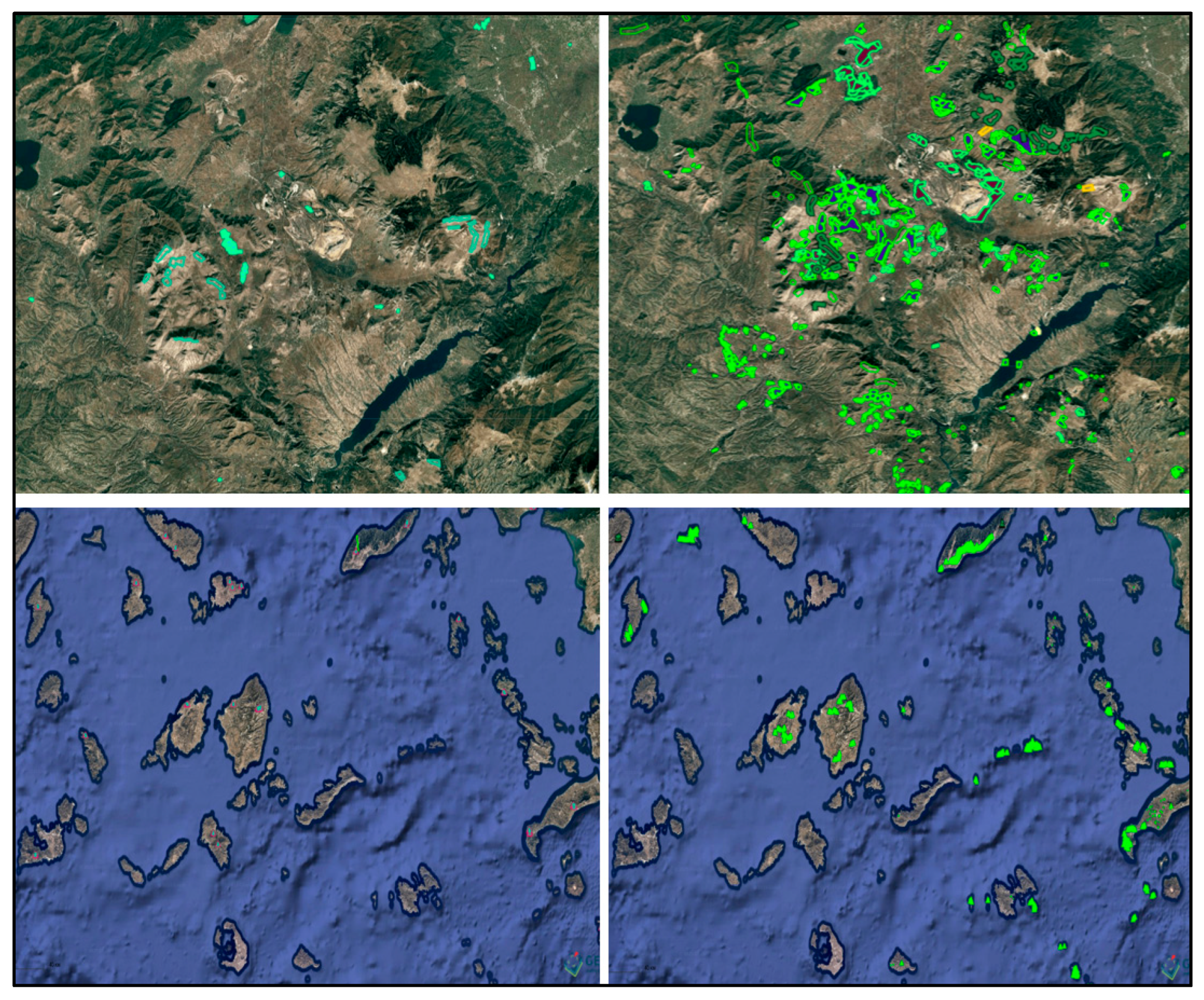
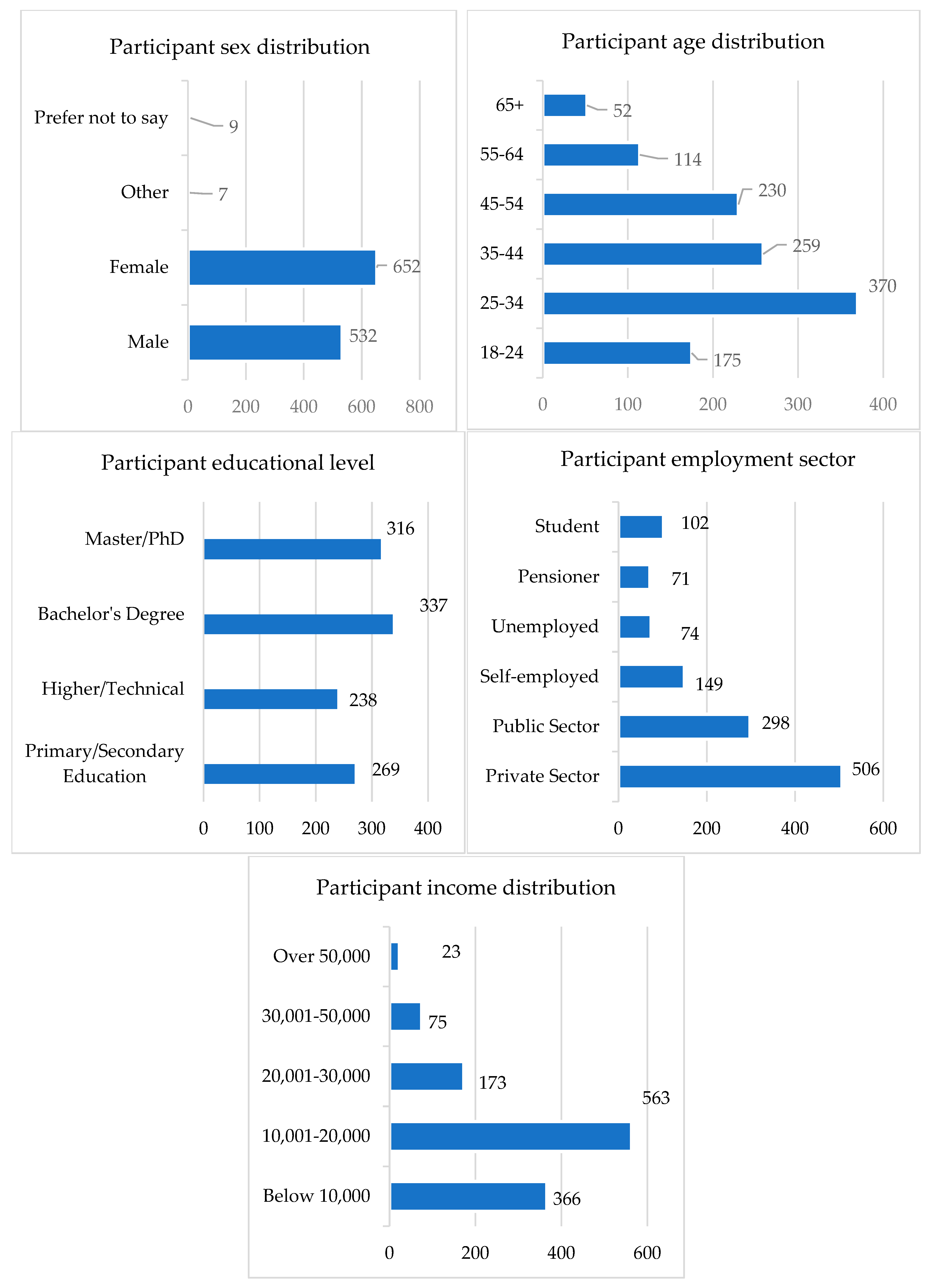
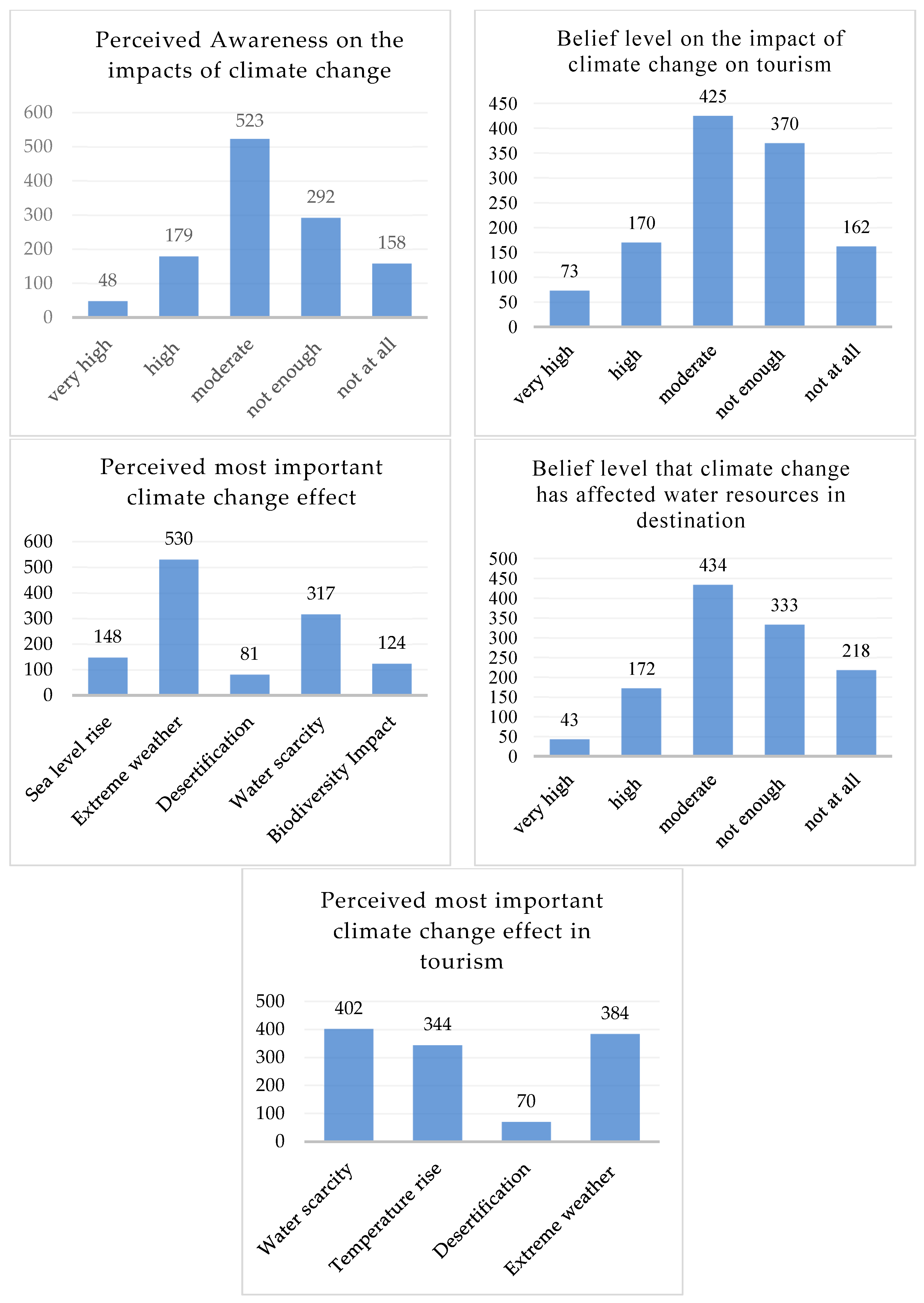
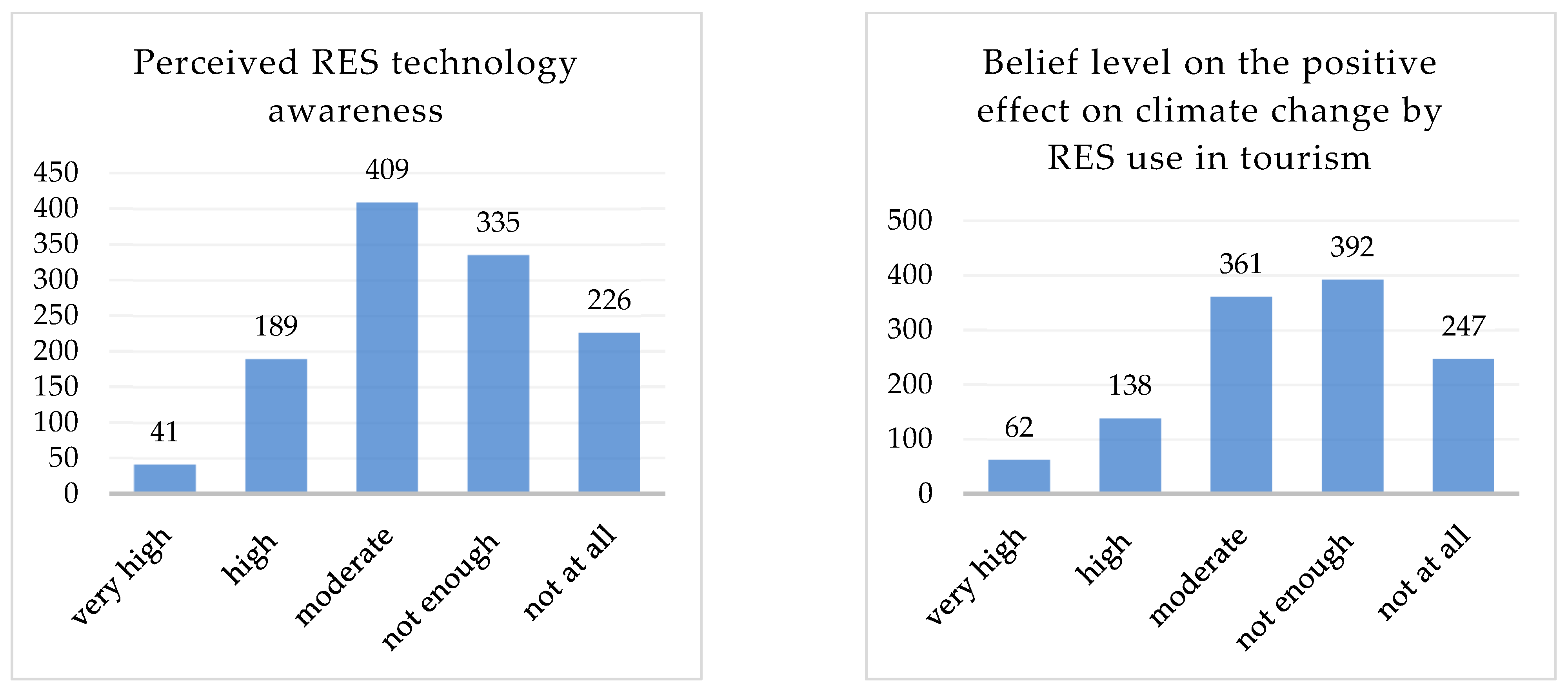
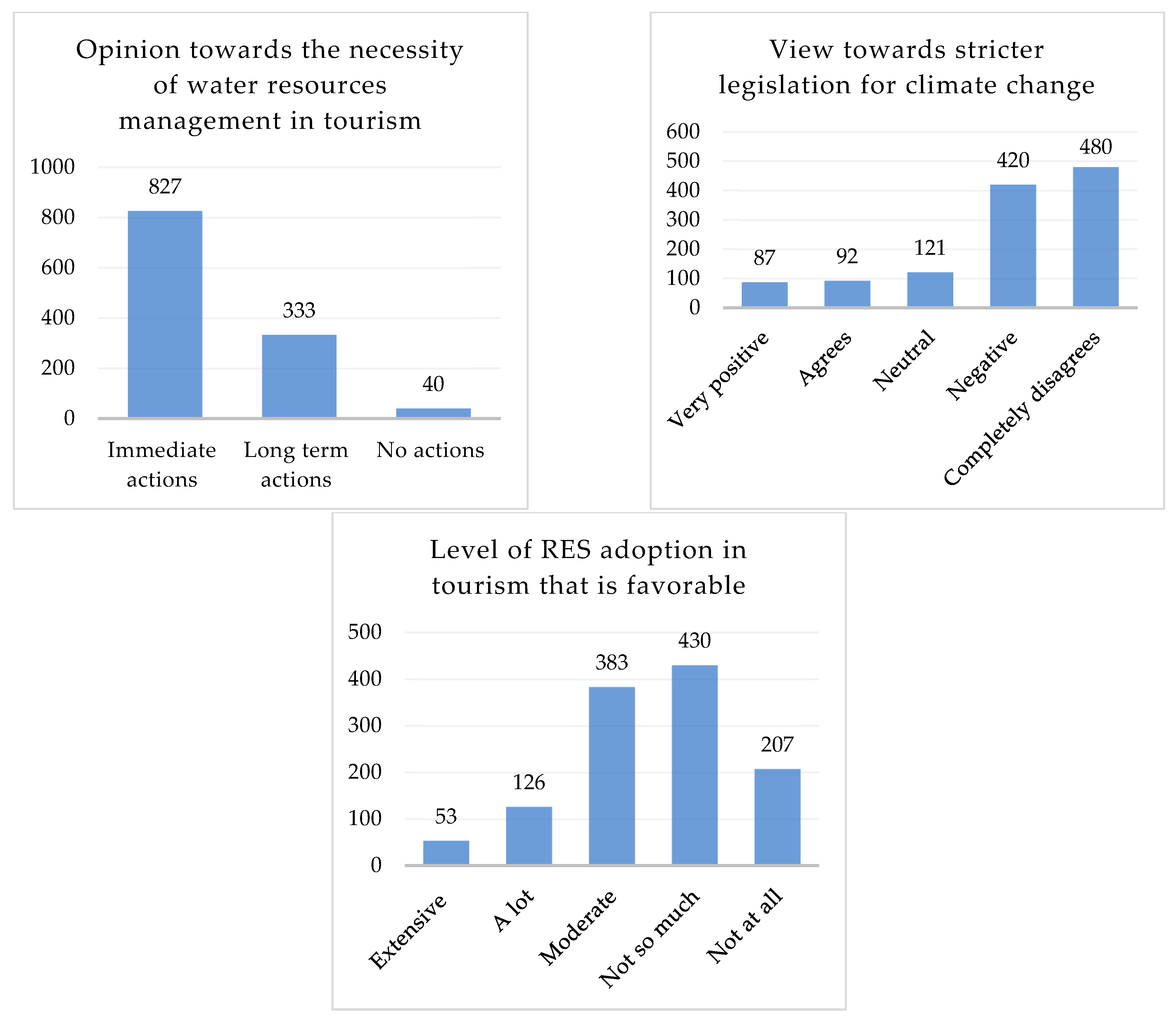
| Correlation Coefficients per Question Pair | |||||||
|---|---|---|---|---|---|---|---|
| Demographics | Question | Awareness | |||||
| Q6 | Q7 | Q8 | Q10 | Q15 | Q16 | ||
| Q | −0.0071 | −9.8 × 10−4 | 0.0077 | 0.072 | 2.4 × 10−4 | 0.004765 | |
| Q3 | 0.146 | 0.0412 | 0.0819 | 0.0979 | 0.1608 | 0.1014 | |
| Q5 | 0.0738 | 0.0381 | 0.0367 | 0.1228 | 0.1018 | 0.0908 | |
| Correlation Coefficients per Question Pair | |||||||
|---|---|---|---|---|---|---|---|
| Awareness | Attitude of Respondents | ||||||
| Question | Q12 | Q13 | Q19 | Q23 | Q24 | Q25 | |
| Q6 | −0.0809 | 0.2166 | 0.0966 | 0.1613 | 0.1583 | 0.278659 | |
| Q7 | 0.03261 | −0.1835 | 0.2711 | 0.235768 | 0.1705 | 0.01411 | |
| Q8 | −0.1853 | 0.2991 | 0.1574 | 0.1873282 | 0.25242 | 0.31714 | |
| Q10 | −0.198879 | 0.4169 | 0.0367 | 0.0523 | 0.1556 | 0.3521 | |
| Q15 | −0.077329 | 0.254109 | −0.0185 | 0.071436 | 0.1414 | 0.3007 | |
| Q16 | −0.12902 | 0.42972 | 0.1094 | 0.150438 | 0.2424 | 0.4254 | |
| Correlation Coefficients per Question Pair | |||
|---|---|---|---|
| Perceived importance of Respondents towards water scarcity | |||
| Awareness | Question | Q9 | Q11 |
| Q6 | 0.0581 | 0.0960 | |
| Q7 | 0.0702 | −0.0355 | |
| Q8 | 0.0483 | 0.0984 | |
| Q10 | 0.0111 | 0.2025 | |
| Q15 | 0.0161 | 0.1126 | |
| Q16 | −0.0276 | 0.1143 | |
Disclaimer/Publisher’s Note: The statements, opinions and data contained in all publications are solely those of the individual author(s) and contributor(s) and not of MDPI and/or the editor(s). MDPI and/or the editor(s) disclaim responsibility for any injury to people or property resulting from any ideas, methods, instructions or products referred to in the content. |
© 2025 by the author. Licensee MDPI, Basel, Switzerland. This article is an open access article distributed under the terms and conditions of the Creative Commons Attribution (CC BY) license (https://creativecommons.org/licenses/by/4.0/).
Share and Cite
Farmaki, P. From Leisure to Responsibility: Environmental Awareness of Domestic Tourists in Greece on Climate, Water Resources, and Renewable Energy Use. Sustainability 2025, 17, 10049. https://doi.org/10.3390/su172210049
Farmaki P. From Leisure to Responsibility: Environmental Awareness of Domestic Tourists in Greece on Climate, Water Resources, and Renewable Energy Use. Sustainability. 2025; 17(22):10049. https://doi.org/10.3390/su172210049
Chicago/Turabian StyleFarmaki, Polytimi. 2025. "From Leisure to Responsibility: Environmental Awareness of Domestic Tourists in Greece on Climate, Water Resources, and Renewable Energy Use" Sustainability 17, no. 22: 10049. https://doi.org/10.3390/su172210049
APA StyleFarmaki, P. (2025). From Leisure to Responsibility: Environmental Awareness of Domestic Tourists in Greece on Climate, Water Resources, and Renewable Energy Use. Sustainability, 17(22), 10049. https://doi.org/10.3390/su172210049






